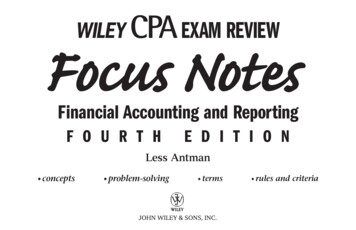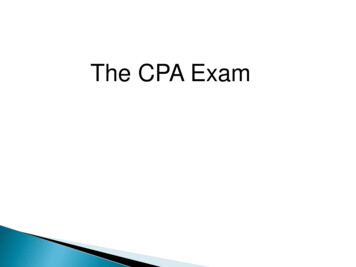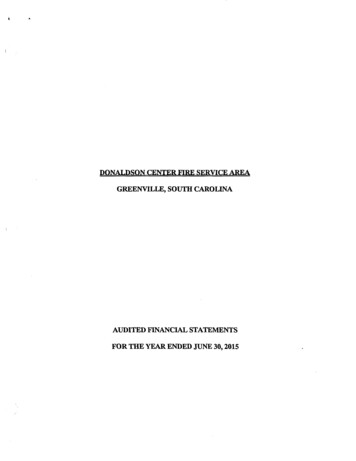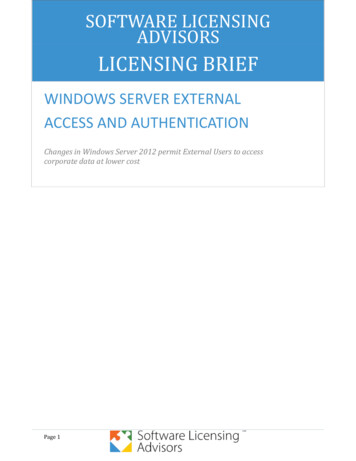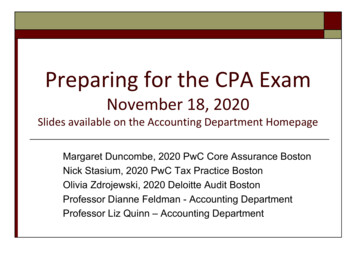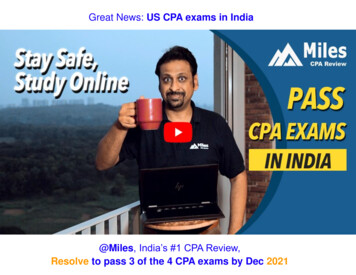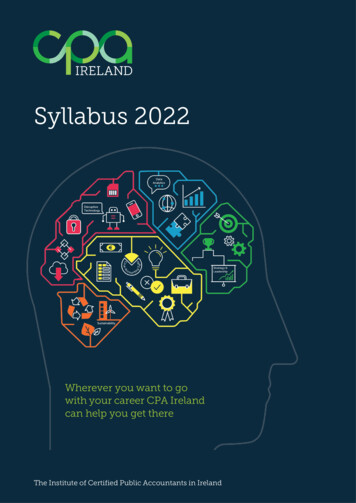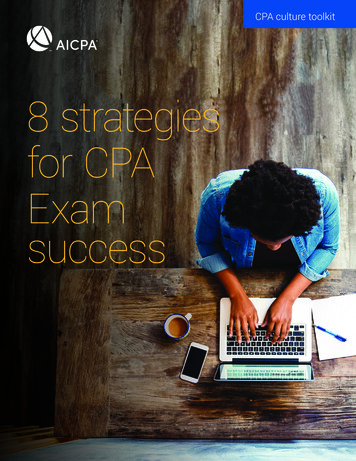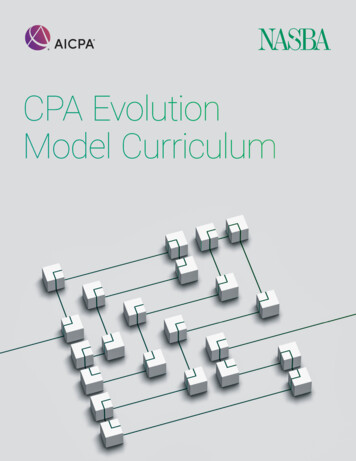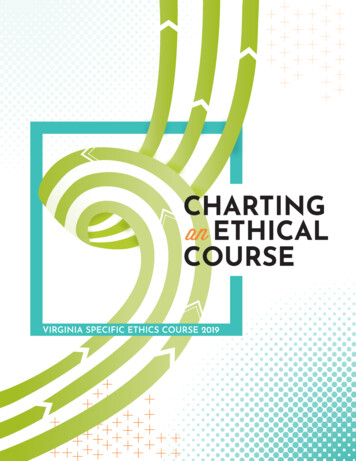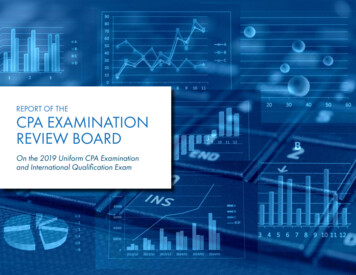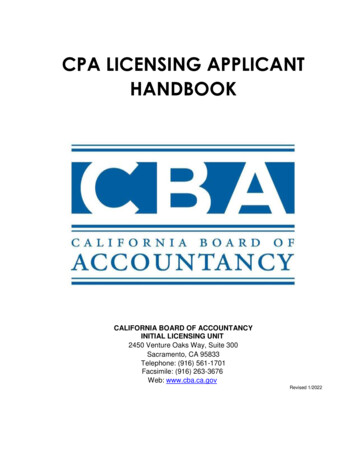
Transcription
CPA LICENSING APPLICANTHANDBOOKCALIFORNIA BOARD OF ACCOUNTANCYINITIAL LICENSING UNIT2450 Venture Oaks Way, Suite 300Sacramento, CA 95833Telephone: (916) 561-1701Facsimile: (916) 263-3676Web: www.cba.ca.govRevised 1/2022
CONTACT INFORMATIONCalifornia Board of Accountancy2450 Venture Oaks Way, Suite 300Sacramento, CA 95833Main Telephone: (916) 263-3680Website: www.cba.ca.govCBA OutreachEmail: outreach@cba.ca.govCertificationsTelephone: (916) 561-1701Enforcement(Filing a Complaint,Enforcement Actions)Telephone: (916) 561-1729Email: enforcementinfo@cba.ca.govExam QuestionsTelephone: (916) 561-1703Email: examinfo@cba.ca.govInitial Licensing(Individual)Telephone: (916) 561-1701Email: licensinginfo@cba.ca.govInitial Licensing(Partnerships, Corporations,Fictitious Name Permits)Telephone: (916) 561-4301Email: firminfo@cba.ca.govLicense LookupTelephone: (916) 263-3680Web site:www.dca.ca.gov/cba/consumers/lookupLicense Renewal(CPA/PA, Partnerships, Corporations,Continuing Education)Telephone: (916) 561-1702Email: renewalinfo@cba.ca.govPractice PrivilegeTelephone: (916) 561-4301Email: pracprivinfo@cba.ca.gov
CALIFORNIA BOARD OF ACCOUNTANCYTABLE OF CONTENTSI.QUALIFYING AND APPLYING FOR A CPA LICENSE . 1II.CALIFORNIA BOARD OF ACCOUNTANCY . 3Mission . 3Authority . 3CBA Responsibilities . 3Initial Licensing Unit . 3III.UNIFORM CPA EXAMINATION . 4Out-of-State CPA Exam Scores to California . 4International Chartered Accountant Licensing Bodies . 4IV.EDUCATIONAL REQUIREMENTS . 5Accounting Subjects. 5Business-Related Subjects . 6Accounting Study . 6Ethics Study . 7Quarter Units. 8Documenting the Education Requirements . 8Self-Assessment Resources . 8Official Transcripts/Foreign Academic Credentials Evaluations . 8United States Recognized Schools . 9Foreign Education . 9V.EXPERIENCE REQUIREMENTS . 10General Accounting Experience Requirement . 10Attest Experience Requirement . 11Signers of the Certificate of Attest Experience Form . 12Appearance before the CPA Qualifications Committee (QC) . 12How to Proceed if Your Supervisor Will Not Complete a Certificate of Experience . 13Experience Calculation . 13Out-of-State Supervisor License Verifications . 14Experience More Than Five Years Old . 14VI.APPLYING FOR A CPA LICENSE . 15Types of Applications for CPA Licensure . 15Application for Authorization to Sign Attest Reports . 15Other Requirements for an Application . 16United States Social Security Number/Individual Taxpayer Identification Number
Requirement . 16Fingerprinting Requirement. 16Live Scan Service (California Residents) . 16Hard Copy Fingerprint Cards (Non-California Residents) . 16California CPA Education Foundation Ethics Examination (PETH) Requirement . 17CPA Licensure and Application Fees. 17Returned Checks . 17The Status of Your CPA Application . 17The CBA takes the following steps to keep you informed of the status of your . 17Military Education and Experience . 18Expedited Licensure for Military Service . 18Honorably Discharged Military Members . 18Spouses and Domestic Partners. 18Expedited Licensure for Refugees, Asylees, and Special Immigrant Visa Holders . 19Name and Address Changes . 19Abandoned Applications . 20License Approval . 20Continuing Education (CE) Requirement for New Licensees. 20Web License Lookup. 21Lost, Stolen, or Damaged CPA Wall Certificate . 21Satisfying the Attest Experience after Licensure (Type F Application) . 21VII.LICENSE RE-ISSUANCE (TYPE D APPLICATION) . 22How to Proceed if Your License is Canceled. 22Important Notes Regarding Re-Issuance . 22VIII.OUT-OF-STATE LICENSEE (TYPE C APPLICANT) . 23Practice Rights for Applicants Licensed as CPAs in Another State . 23IX.FORMS . 24X.FREQUENTLY ASKED QUESTIONS (FAQS) . 24
I.QUALIFYING AND APPLYING FOR A CPA LICENSE1
2
II.CALIFORNIA BOARD OF ACCOUNTANCYMissionThe mission of the California Board of Accountancy (CBA) is to protect consumers byensuring only qualified licensees practice public accountancy in accordance withestablished professional standards.AuthorityThe CBA derives its authority from the Business and Professions Code (BPC), Division3, Chapter 1, Article 1 through Article 10 (Accountancy Act) and the California Code ofRegulations, Title 16, Division 1, Article 1 through Article 13 (CBA Regulations). Pleasevisit the CBA website site at www.cba.ca.gov for the most recent version of theAccountancy Act and CBA Regulations.CBA Responsibilities Sets and examines applicants’ educational and experience requirements forCalifornia certified public accountants (CPAs) licensure. Regulates the practice of public accountancy in California and may deny licensure,suspend, revoke, or refuse to renew any license, permit, or certificate for violation ofthe Accountancy Act, CBA Regulations, or other laws under the CBA’s jurisdiction. Regulates, prescribes, amends, or repeals the rules of professional conductappropriate to the establishment and maintenance of a high standard of integrity andcompetency in the profession.The CBA website, www.cba.ca.gov, contains valuable information for licensees, CPAexamination candidates, licensure applicants, and consumers regarding CBA meetings,forms, enforcement matters, as well as the CBA’s publication UPDATE.Initial Licensing UnitThe primary responsibility of the Initial Licensing Unit (ILU) is to process applications forCPA licensure, including the review of an applicant’s examination, education,experience, and other licensure requirements to ensure that applicants meet allqualifications of the Accountancy Act and CBA Regulations.As a source of reference, please refer to the CBA website for the application andmaterial checklists. Information regarding the status of your CPA application can beobtained by contacting the ILU by email at licensinginfo@cba.ca.gov or by phone, at(916) 561-1701.3
III.UNIFORM CPA EXAMINATIONPrior to applying for a CPA license, you must pass the Uniform CPA Examination (CPAExam) developed by the American Institute of Certified Public Accountants (AICPA). Ifyou passed the CPA Exam in California, the CBA will have your scores on file.Out-of-State CPA Exam Scores to CaliforniaUnder BPC 5082.5, the CBA may give credit to an applicant who has passed the CPAExam in another state or territory, if the members of the CBA determine that thestandards under which the CPA Exam was held are as high as the standardsestablished for the CPA Exam in California. California will accept examination scoresonly if the applicant met California’s education requirements prior to the date anapplicant physically sat for the CPA Exam, not the dates the grades were released bythe other state or territory.If you passed the CPA Exam in a state or territory other than California, you must havea certification of your CPA Exam scores sent to California by the state in which youpassed the CPA Exam or by the National Association of State Boards of Accountancy(NASBA). An Authorization for the Release of Examination & Licensure Informationmust be completed by an official of the state of origin, and it must be mailed directlyfrom the state of origin to the CBA.California does not recognize reciprocity. If an out-of-state CPA wishes to hold out andpractice in California, he or she must submit an Application for CPA Licensure and meetCalifornia’s education and licensing requirements. Please refer to the Out-of-StateLicensee (Type C) section later in this booklet for information about this applicationprocess.International Chartered Accountant Licensing BodiesMembers of the following international chartered accountant licensing bodies may takethe International Uniform Certified Public Accountant Qualification Examination (IQEXExam) in lieu of the CPA Exam: Chartered Professional Accountants of CanadaInstituto Mexicano de Contadores PúblicosChartered Accountants IrelandChartered Accountants Australia and New ZealandHong Kong Institute of Certified Public AccountantsCPA AustraliaInstitute of Chartered Accountants of ScotlandSouth African Institute of Chartered Accountants4
An official certification of your IQEX Exam scores must be submitted directly to the CBA byNASBA. Information regarding the IQEX Exam and score transfers may be obtained onNASBA’s website or by phone, at (888) 696-2722.Please note: passage of the IQEX Exam does not replace the CBA’s educationalrequirements. Applicants must submit appropriate documents substantiating completionof the education requirements.IV.EDUCATIONAL REQUIREMENTSAll applicants for licensure must meet the following minimum educational requirements: A baccalaureate degree or higher conferred by a degree-granting college oruniversity accredited by a United States (U.S.) regional institutional accreditingagency or national accrediting agency, (or foreign equivalent evaluated by aCBA-approved foreign academic credentials evaluation service). 150 total semester units which includes the following1:oooo24 semester units of core accounting subjects24 semester units of core business subjects20 semester units accounting study (accounting and business subjects)10 semester units ethics studyThe requirements apply to all applicants for initial licensure, regardless of when theypassed the CPA Exam, with the exception of those applying for reissuance aftercancellation of a California CPA license.Accounting SubjectsCBA Regulations section 9.2(b) defines the following subjects as qualifying toward the24 semester units of core accounting subject requirement: AccountingAuditing External & Internal reporting 1Financial ReportingFinancial Statement AnalysisTaxationNote that the educational requirements to sit for the CPA Exam are less than what is required for licensure.To learn what the educational requirements are to sit for the CPA Exam, please refer to the Uniform CPAExamination Handbook.5
Business-Related SubjectsCBA Regulations section 9.2(c) defines the following subjects as qualifying toward the24 semester units of core business-related subject requirement: Economics Business Administration Finance Business Communications Marketing Business Law Mathematics Business Management Statistics Computer Business-related lawScience/Informationcourses offered at anSystemsaccredited law schoolAccounting courses in excess of the 24 semester units needed to fulfill the coreaccounting subject requirement may be used to satisfy the business-related subjectrequirement.Accounting StudyCBA Regulations section 11.1 defines the 20 semester unit accountingstudy requirement as consisting of the following: Minimum six semester units in accounting subjectsMaximum of 14 semester units in business-related subjectsAccounting SubjectPlease note: six semester units of accounting subjects required for accounting studyare in addition to the 24 semester units of core accounting courses.Business-related subjectsBusiness units in excess of the core 24 semester units will be applied towards the 14semester units of the accounting study requirement. When the additional 14 semesterunits of accounting study cannot be satisfied with excess business subjects alone, thefollowing coursework may be used to complete the requirement: Total of nine semester units in other academic work relevant to businessand accounting (maximum three units from any of the following areas ofstudy):o Area 1 - Courses completed in the following disciplines: English,Communications, Journalism, and the Physical, Life, Natural, andSocial Scienceso Area 2 - Courses completed in foreign languages (including signlanguage) and courses with the terms “culture” or “ethnic” in thetitles6
o Area 3 - Courses completed in the following disciplines: Engineering,Architecture, and Real EstateMaster’s DegreeThe conferral of a Master of Accounting, Taxation, or Laws in Taxation satisfies theaccounting study requirement. Coursework completed to obtain one of the identifiedmaster’s degree may be applied to other areas of required education, such as coreaccounting and business subjects or ethics study.Ethics StudyBPC section 5094.3 defines the following course subject matter as qualifying toward the10 semester units of ethics study subject requirement: Minimum of three semester units in accounting ethics, accountants’ professionalresponsibilities, auditing, or fraud. The course must be completed at an upperdivision or higher, unless it was completed at a community college. The remaining seven semester units may be completed in courses from thefollowing subject areas relating to ethics:ooooooooo o Legal Environment ofBusinesso Management ofOrganizationso Human ResourcesManagemento Business, Government &Societyo Corporate SocialResponsibilityAuditingBusiness LawFraudEthicsMoralsBusiness LeadershipCorporate GovernanceOrganizational BehaviorProfessionalResponsibilitiesA maximum of three semester units of courses taken in the disciplines ofPhilosophy, Religion, or Theology with the sole name of the course being the sameas the discipline, or with one of the following words or terms in its title:ooooo Principles ofo Fundamentals ofo Foundations ofIntroductionIntroductorySurvey ofGeneral7
Quarter UnitsCourses earned at college and universities on a quarter unit calendar must bemultiplied by a factor of 2/3 to convert to semester units. For example, 4 quarter unitsare equivalent to 2 2/3 (2.67) semester units.Documenting the Education RequirementsPrior to submitting your application for licensure, you should ensure that alleducational requirements have been met. Due to the high volume of applicationsprocessed, the CBA does not pre-qualify courses or evaluate transcripts prior tosubmission of an application for licensure.The CBA uses official transcripts/foreign academic credentials evaluations as the solebasis for determining whether candidates meet the educational requirements to qualifyfor licensure.Self-Assessment ResourcesThe CBA created the Educational Requirements for CPA Licensure Self-AssessmentWorksheet as a tool to assist you in evaluating the education you have alreadycompleted and plan to complete to compare to the new educational requirements. Youmay obtain additional resources and samples of completed self-assessment worksheetson the CBA website.Official Transcripts/Foreign Academic Credentials EvaluationsOnly official documents detailing completion of the education requirements will beaccepted. The CBA is now accepting electronic delivery of transcripts through one ofthese services: National Student Clearinghouse; Parchment; Credential Solutions;eScrip-Safe; and The University of Texas, Austin. In instances where colleges use oneof these services, applicants may request transcripts to be sent to the CBA via email.When submitting the request for electronic delivery of transcripts, please use thefollowing email address as the recipient: CBAtranscripts@cba.ca.gov (note that thisemail account is only monitored for transcript submission).As an alternative to electronic submission, the CBA will accept hard-copy officialtranscripts from the applicant or directly from the U.S. educational institution (orcollege’s designated third party transcript provider). To be considered, the officialtranscript must be sent in the original envelope sealed by the U.S. educationalinstitution (or school’s designated third party transcript provider) and mailed to:California Board of AccountancyInitial Licensing Unit2450 Venture Oaks Way, Suite 300Sacramento, CA 95833At this time, all foreign credentials evaluations must be sent via mail by the foreign8
credentials evaluation service, those must be mailed to:California Board of AccountancyInitial Licensing Unit2450 Venture Oaks Way, Suite 300Sacramento, CA 95833IMPORTANT: All required coursework and degree conferral must be shown on officialtranscripts and/or evaluations. Prior to requesting official transcript(s), please confirmwith your school that your conferred baccalaureate degree has been posted.The CBA highly recommends that you request official transcripts from all institutions atwhich you completed coursework, since many college and university transcripts onlyindicate the total transfer units accepted and do not list the titles of the individualcourses.Most colleges and universities or third party transcript providers typically take two to sixweeks to post degrees on official transcripts, and 10 to 15 days to process requests forofficial transcripts. Foreign credentials evaluation services typically take from three tosix weeks to provide evaluation reports.United States Recognized SchoolsThe CBA only accepts education completed at degree-granting colleges, universities, orother educational institutions recognized by a U.S. regional institutional accreditingagency or a national accrediting agency. Most transcripts include accreditationinformation. If you are unsure whether a college or university is accredited, you shouldcontact the appropriate college or university directly. You can find a complete list ofNational Accrediting Agencies at https://www.ed.gov/accreditation.Foreign EducationIf you attended or graduated from a foreign school, you may satisfy the educationalrequirements based on an evaluation of your foreign transcripts by any of the CBAapproved foreign credentials evaluation services. You can access the most current listof CBA-approved foreign credentials evaluation services via the CBA website.9
V.EXPERIENCE REQUIREMENTSQualifying experience must be supervised and verified by an individual holding an activevalid license to practice public accountancy. Your supervisor must have authority andoversight over you, and must have reviewed and evaluated your qualifying work on aroutine and recurring basis.General Accounting Experience RequirementApplicants must provide the CBA with satisfactory evidence of having completed aminimum of 12 months of general accounting experience. BPC section 5093 definesgeneral accounting experience as providing any type of service or advice involving theuse of accounting, attest, compilation, management advisory, financial advisory, tax, orconsulting skills.All experience must be performed in accordance with applicable professional standards.Qualifying experience may be gained through employment in public accounting, privateindustry, or government.General accounting experience obtained in public accounting must be supervised by anindividual who holds a valid active license, or comparable authority, to practice publicaccountancy under the laws of any state or country. This experience will bedocumented on the Certificate of General Experience (CGE) – Public Accounting Formwhich must be signed by your supervisor. A second person with an active license andownership of the firm must also verify the applicant’s experience. If the licensee whosupervises the applicant is a sole proprietor, partner, or shareholder, no secondsignature is required.General accounting experience obtained in private industry or government accountingmust be supervised by an individual who holds a valid active license to practice publicaccountancy in the U.S. or its territories. This experience will be documented on theCGE – Non-Public Accounting Form which must be signed by your supervisor. If thelicensee supervising the experience is the owner of the private industry company, asecond signature is not required. If, however; the supervising licensee is not the owner,the experience form must be signed and verified by a second person with a higher levelof responsibility in the private industry company or governmental agency. The secondsigner is not required to hold a license to engage in the practice of public accountancy.10
Experience acquired in academia is considered qualifying toward general accountingexperience if the requirements of CBA Regulations section 12.1 are met. The applicantmust be the instructor of a course in an accounting subject listed in CBA Regulationssection 9.2(b): accounting, auditing, financial reporting, external or internal reporting,financial statement analysis or taxation. In evaluating an applicant’s experience inacademia, the CBA considers 48 semester units of instruction equivalent to one year ofgeneral accounting experience.Experience obtained in academia must be documented on the Certificate of Experiencein Academia and be verified by the dean, head, or chair of the applicant’s departmentwho has authority and oversight over the applicant.Attest Experience RequirementApplicants who wish to be licensed with the authority to sign reports on attestengagements must provide the CBA with satisfactory evidence of having completed aminimum of 12 months of general accounting experience including a minimum of 500hours of attest experience. BPC section 5095 and CBA Regulations section 12.5requires attest experience to include the following:1. Experience in the planning of the audit, including the selection of the proceduresto be performed.2. Experience in applying a variety of auditing procedures and techniques to theusual and customary financial transactions included in financial statements.3. Experience in the preparation of working papers in connection with the variouselements of 1 and 2 above.4. Experience in the preparation of written explanations and comments on the workperformed and its findings.5. Experience in the preparation of and reporting on full disclosure financialstatements.The performance of financial statement audits should primarily fulfill the experiencerequirement. In addition, attest experience may include a combination of: Review services to the extent they comply with the documentation ofanalytical procedures and the development of expectations as required bythe Statements on Standards for Accounting and Review Services.Generally, only analytical review procedures qualify; however, the scope of workmay be extended in selected areas and, thereby may qualify. Experienceobtained in other areas (such as accounting write-up, tax compliance,11
consultations, forecasting, and projections) is not considered qualifyingunder CBA (CCR) Regulations section 12.5. Other attest services, including, but not limited to:o Statements on Standards for Attestation Engagements (SSAE) No. 16o Agreed-upon procedureso Compliance auditsCompilation services obtained after December 31, 2007, are no longer accepted asqualifying attest experience for licensure.An affirmatively completed Certificate of Attest Experience (CAE) form must be submitteddirectly to the CBA office by your employer. If your attest experience was obtained at apublic accounting firm, your employer will need to complete the CAE – Public AccountingForm. If your attest experience was obtained at a private industry company or governmentagency, your employer will need to complete the CAE – Non-Public Accounting Form. TheCBA will take into consideration all Certificates of Attest Experience submitted in eitherindividual or composite form, in evaluating your attest experience.The CBA will not grant credit for attest experience for areas of the Certificate of AttestExperience that are non-affirmatively completed. Partial credit may be granted if someof the questions have been affirmatively completed. Attest experience obtained outsidethe U.S. (foreign) must be documented on a separate Certificate of Attest Experience.Signers of the Certificate of Attest Experience FormThe requirements for the signer are identical to those for a signer of a generalaccounting experience form, with the exception that the supervisor must have theauthority to perform attest services.Appearance before the CPA Qualifications Committee (QC)Applicants may be required to appear before the QC to present work papers or provideother evidence, substantiating that their experience meets the requirements of theAccountancy Act and CBA Regulations.Applicants who are applying with foreign attest experience must appear before the QCand present audit work papers or provide other evidence that substantiates thesatisfactory completion of the attest experience requirement. The work paperssubmitted must be in English. As an alternative to appearing with the foreign workpapers, an applicant may obtain a minimum of 500 hours of qualifying attest experiencecompleted in the U.S. The work must result in an affirmatively completed Certificate ofAttest Experience form.12
How to Proceed if Your Supervisor Will Not Complete a Certificate of ExperienceIf your supervisor will not complete a Certificate of Experience on your behalf, the CBArecommends you proceed with the following steps:1.Submit a written request to your supervisor asking that he or she complete theCertificate of Experience on your behalf and submit a copy to the CBA. Yourrequest should provide the supervisor with a reasonable amount of time torespond. It is suggested that all correspondence be sent Certified Mail, ReturnReceipt Requested.2.If your supervisor does not respond, a follow-up request in writing should bemade.3.If your supervisor still does not respond, and you have filed your applicationwith the CBA, you may submit a letter requesting that the CBA assist you.Copies of the original and follow-up letters should accompany your request.Once the above steps have been completed, the CBA will contact the supervisor onyour behalf to request submission of a written explanation regarding why they would notcomplete and submit the Certificate of Experience on your behalf. The supervisor willbe notified that any individual, whether or not they have filed an application for licensurewith the CBA, has the right to file a complaint if they believe their supervisor is impedingthem from becoming licensed.Under the provisions of CBA Regulations section 69, if y
Out-of-State CPA Exam Scores to California Under BPC 5082.5, the CBA may give credit to an applicant who has passed the CPA Exam in another state or territory, if the members of the CBA determine that the standards under which the CPA Exam was held are as high as the standards established for the CPA Exam in California.
